Key takeaways:
- Understanding local market dynamics is crucial; successful strategies are based on cultural nuances and authentic connections rather than just data.
- Identifying and building relationships with local experts can provide invaluable insights that enhance marketing strategies and foster community engagement.
- Adapting approaches based on real-time consumer behavior observations and local customs is essential for successful scaling and market entry.
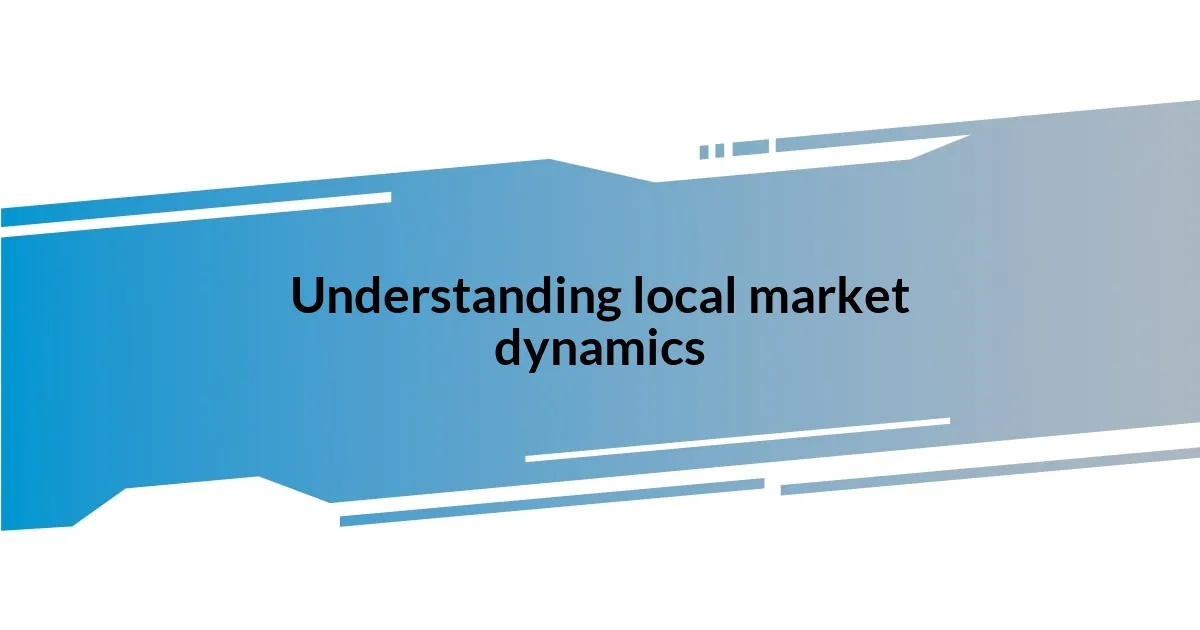
Understanding local market dynamics
Understanding local market dynamics is more than just crunching numbers; it’s about grasping the heartbeat of a community. I remember being in a bustling market in Southeast Asia, where the traditional sellers knew exactly what products resonated with local customs and preferences. Observing their interactions reminded me how critical it is to embrace cultural nuances to succeed.
I often find myself asking: what makes a product truly appealing to a local audience? For instance, when launching a product in a new country, I realized that our marketing strategy had to reflect local values. My experience taught me that listening to local voices—not just analyzing data—creates a more authentic connection with consumers.
There’s tremendous power in local storytelling, and I’ve seen firsthand how it shapes perceptions. When I worked on a campaign that highlighted local artisans, it struck a chord with consumers, as they felt a personal connection. This taught me that understanding local market dynamics isn’t just about the trends; it’s about creating meaningful relationships that resonate with people on a deeper level.
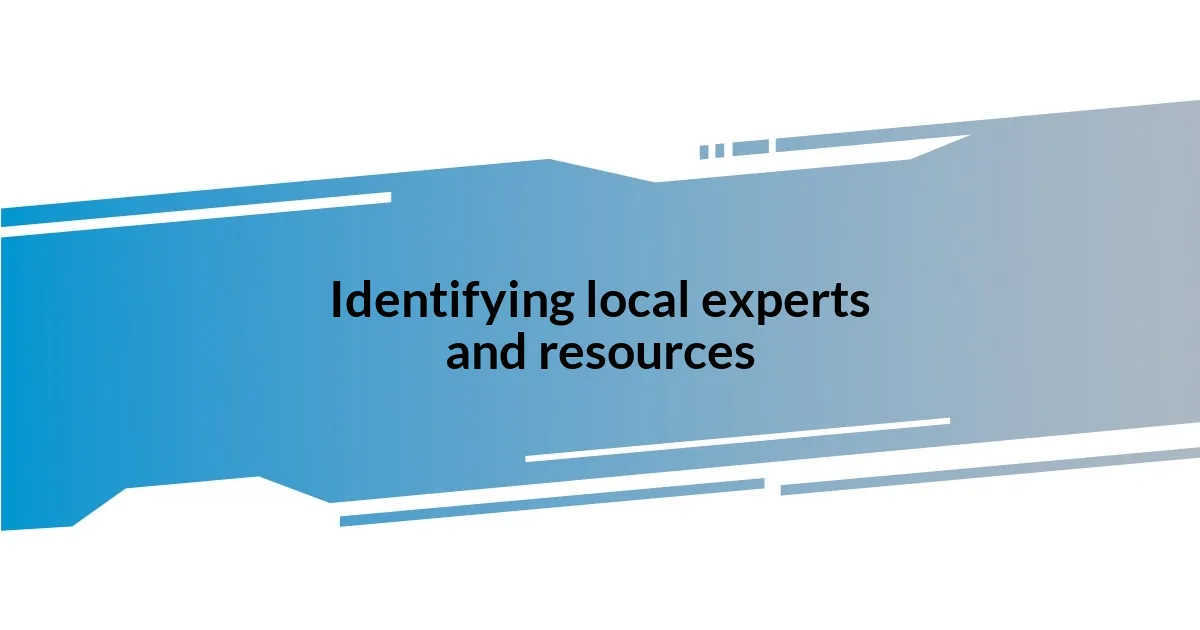
Identifying local experts and resources
Identifying local experts is paramount, and I’ve learned this through experience. In one of my ventures, I found that simply tapping into local universities and trade organizations opened doors to invaluable knowledge. These institutions often house passionate individuals who are adept at understanding regional needs and can provide insights that data alone cannot.
Here are some strategies I’ve used to identify local experts and resources:
- Network within local business communities: Attend local events and trade shows to meet potential experts face-to-face.
- Leverage social media platforms: Engage with local influencers and professional groups that specialize in your market area.
- Consult local government resources: Many regions have economic development offices that can connect you with industry experts.
- Reach out to alumni associations: Connecting with alumni from your area who have ventured into relevant fields can provide unique insights.
- Conduct informal interviews or surveys: Talking directly to consumers about their preferences could unveil voices that traditional research might miss.
As I navigated through these processes, I found that being open and approachable led to unexpectedly rich conversations. In one instance, I met a local entrepreneur who shed light on specific consumer pain points that had never crossed my mind. His insights not only refined my approach but also deepened my appreciation for the community’s unique challenges and dynamics. It was a reminder that local knowledge is a treasure trove waiting to be uncovered.
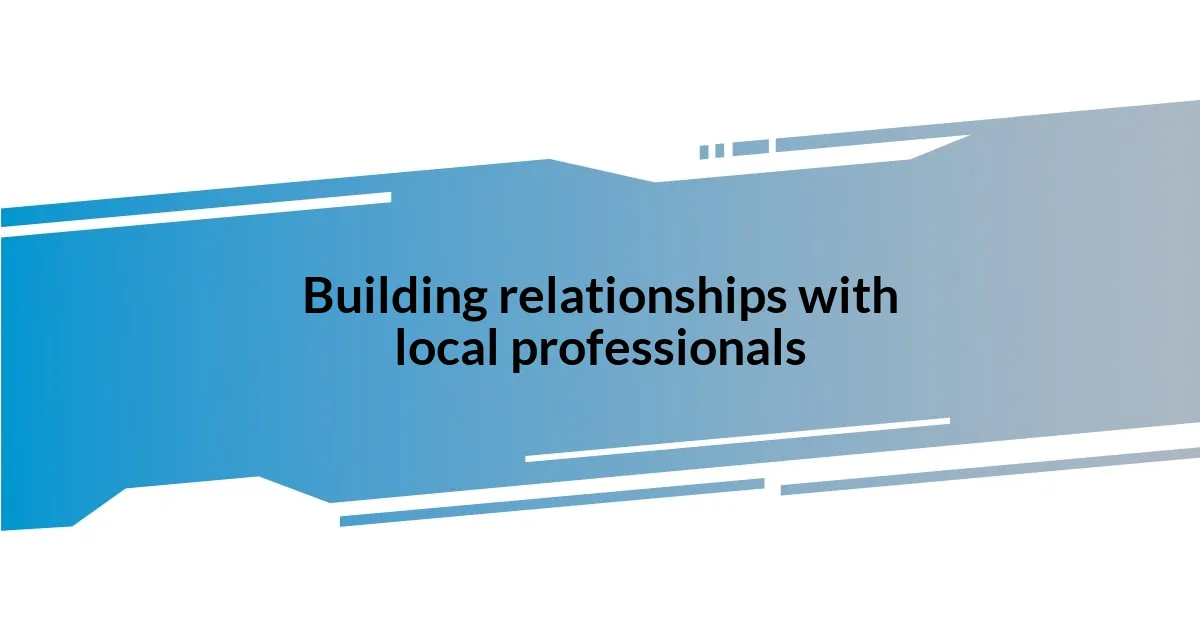
Building relationships with local professionals
Building relationships with local professionals isn’t just beneficial; it’s essential. I’ve experienced the difference firsthand. When I was in South America, I dedicated time to meeting local business leaders over coffee, not only to exchange ideas but to form genuine friendships. These connections opened up avenues I never anticipated, from collaborative projects to mutual referrals, creating a sense of community that was invaluable.
The power of local relationships became particularly clear during a project launch in a new city. I was fortunate to partner with a local PR professional who provided insights that only an insider could offer. She introduced me to key influencers, which dramatically increased my project’s visibility. I often think about how these relationships not only enhanced my work but also enriched my understanding of the culture and its people.
Striking a balance between professional and personal interactions has been pivotal. I recall attending a local festival where I was invited to join a booth run by locals promoting their crafts. Participating in these experiences deepened my relationship with them beyond business—it turned into shared stories and laughter. This emotional connection fostered trust, making it much easier to collaborate on future endeavors. Overall, investing time in these relationships has made my approach to foreign markets not just market-driven, but people-driven.
| Approach | Description |
|---|---|
| Network at Local Events | Meeting potential experts face-to-face fosters genuine connections and trust. |
| Engage on Social Media | Connecting with local influencers allows for deeper insights and community context. |
| Consult Local Institutions | Building ties with local universities and trade organizations can uncover vital knowledge. |
| Participate in Community Activities | Immersing yourself in local events creates opportunities for bonding and collaboration. |
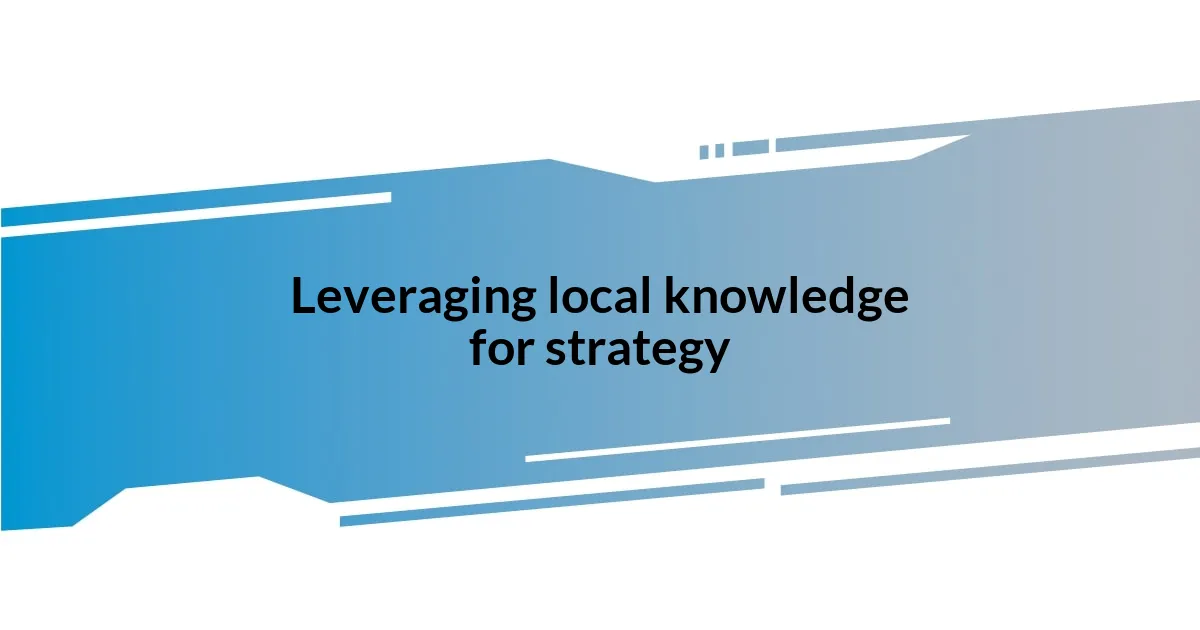
Leveraging local knowledge for strategy
Leveraging local knowledge for strategy has been a game changer in my international ventures. In one instance, while launching a product in Southeast Asia, I turned to local food bloggers to gather insights on regional tastes and preferences. Their feedback not only shaped our marketing strategy but led me to reimagine the product’s feature set. I often wonder, how many companies miss out on similar opportunities simply because they underestimate the power of local voices?
Throughout my experiences, I’ve found that integrating local expertise into strategic planning creates a more relevant and culturally sensitive approach. I recall collaborating with a small team of writers from the area who understood the local nuances that my initial research overlooked. Their contributions were invaluable—they revealed that colloquial expressions could be woven into our messaging, making it resonate on a deeper level. It’s moments like these that remind me of the profound insights that come from true local immersion.
It’s fascinating to realize how much richer a strategy becomes when you weave in the threads of local knowledge. The first time I invited local chefs to our brainstorming sessions, I was genuinely amazed by the creativity they brought with them. Their understanding of local culinary traditions helped us craft not just a flavor profile but a narrative that connected with our audience’s heritage. I’ve often asked myself, what if we all took the time to pause and listen? The wealth of strategic advantage lies in those conversations waiting to happen.
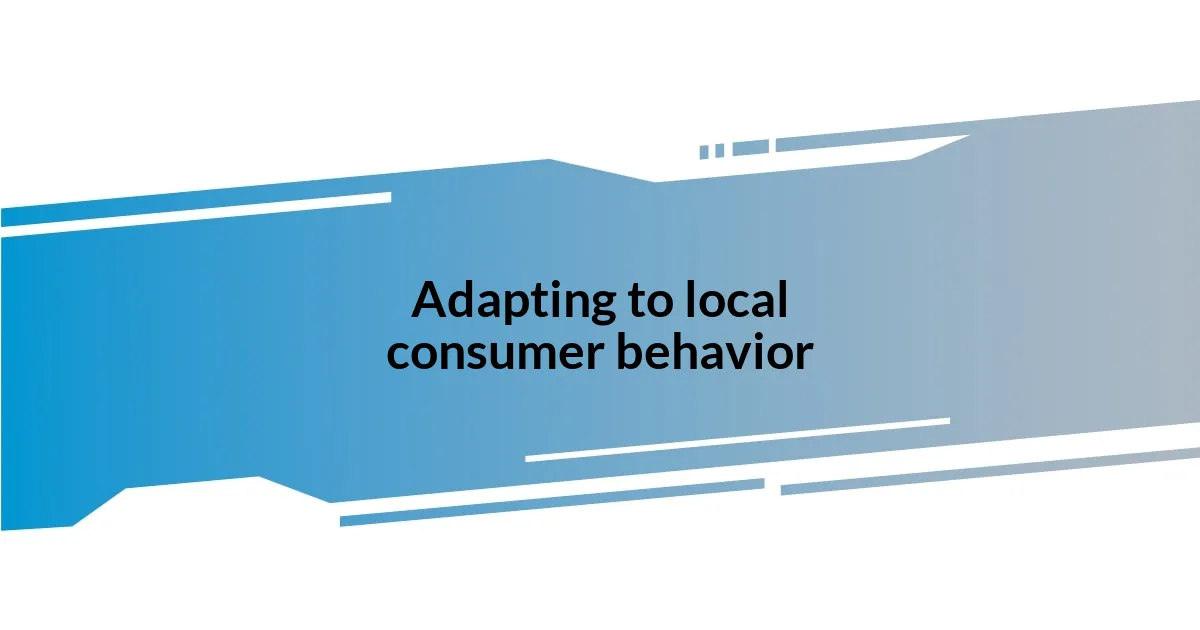
Adapting to local consumer behavior
Adapting to local consumer behavior requires more than just understanding demographics; it’s about immersing oneself in the culture. I vividly remember my first visit to a bustling market in India, where I came face to face with the vibrant tapestry of local preferences. Observing how families shopped and interacted helped me tailor my approach to align with their values and needs, transforming my strategy from generic to deeply personal. Has there ever been a moment when you realized the power of real-time observation over data analysis?
What struck me the most was how quickly consumer behavior can shift based on local customs. During a product rollout in the Middle East, I learned that factors like religious observances and local holidays significantly influenced purchasing patterns. I adapted my marketing schedule to accommodate this, resulting in a remarkable increase in engagement and sales. It’s moments like these that show how diligently paying attention to local practices can create opportunities that no market research alone can predict.
Engagement with locals often led to enlightening conversations, revealing preferences I’d never considered. I recall a cafe outing where a barista shared how her customers valued locally sourced ingredients. Inspired, I adjusted our product sourcing to reflect that preference, which led to a community-driven campaign that resonated beautifully. Have you ever tapped into consumer insights that changed your perspective on a market? It’s incredible how a simple dialogue can illuminate pathways to success.
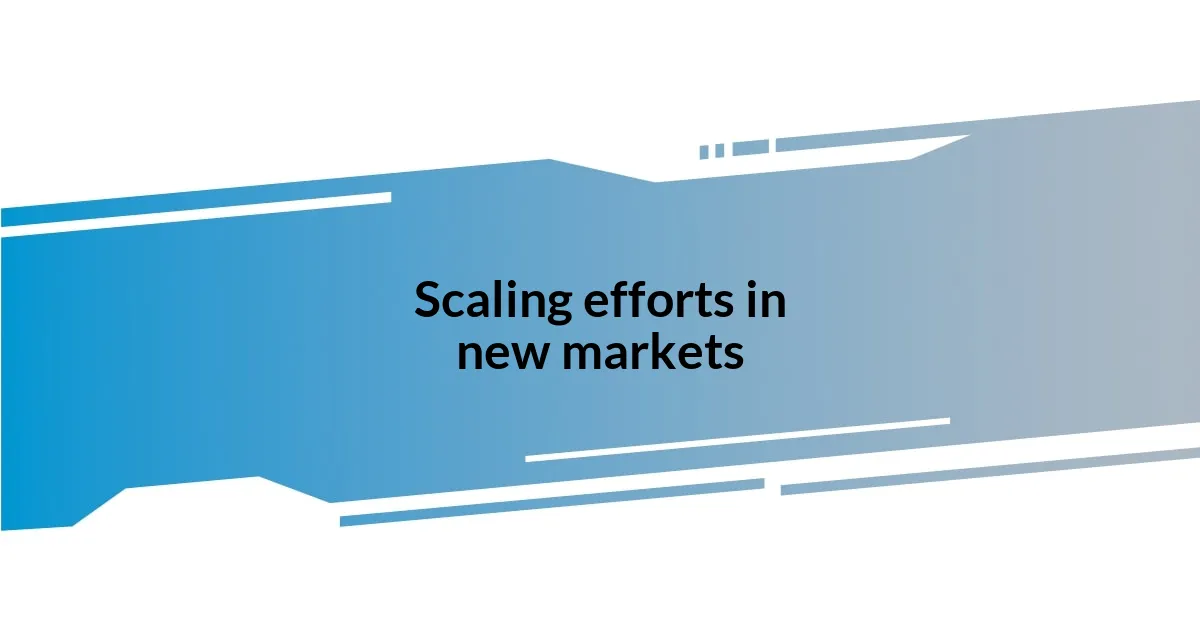
Scaling efforts in new markets
Scaling efforts in new markets often feels like navigating a dense fog; it can be challenging to see far ahead. I remember when I began expanding into Latin America, and my initial approach was overly ambitious. I quickly learned that jumping in without first understanding the local landscape could backfire. By connecting with local entrepreneurs, I discovered they had already carved out niches that I hadn’t considered, turning my missteps into unique opportunities. How many times do we think we have all the answers when local insight is just around the corner?
As I refined my scaling strategy, I focused on building partnerships with local organizations. One particular collaboration stands out: I teamed up with a local charity, and together, we organized community events that not only promoted our brand but also created genuine connections. The joy and trust we built through these events opened doors I never expected. It made me ponder—what’s more powerful than a brand loved by the community? Having the locals champion your cause is a scaling strategy that pays dividends.
Ultimately, achieving scale is about being adaptable and responsive. I learned the hard way that cookie-cutter strategies fall short when you’re not attuned to local contexts. I vividly recall our first promotional campaign in Brazil, where we launched a playful social media contest. It quickly flopped because it didn’t consider local humor. Adjusting our content based on feedback from Brazilian influencers led to a remarkable turnaround. Have you ever felt the weight of a misaligned campaign? It’s in these moments of reflection and adjustment where the real magic happens in scaling efforts.
